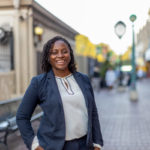[Note: The Story Exchange will be writing about women candidates running for office in 2022 throughout the year.]
Until recently, Michele Rayner was running to represent Florida in the U.S. House.
Currently a member of Florida’s state house representing its 70th district, Rayner launched her campaign for higher office roughly a year ago, in the hopes of bringing a progressive voice to Washington. If she had won, the openly queer politician would have been Florida’s first out U.S. representative.
But last month, the Democratic lawmaker pulled out of the race for Florida’s 13th congressional district entirely. And she wasn’t shy about why.
“[A]s many of you know, we have a governor and we have a legislature that is out of control,” she said in a video posted to her campaign site. “They have drawn maps that are racist, that are partisan, that I believe – and quite frankly, many people believe – are illegal.”
The change makes it impossible to conduct a fair election, the Clearwater resident added.
Every 10 years, Florida’s electoral maps are redrawn. This year’s effort was a Republican-controlled process, and the new maps are likely to further cement GOP control of state- and federal-level seats. For example: Before the Florida-Supreme-Court-backed redistricting took place, Florida had 15 congressional districts won by President Donald Trump in 2020, and 12 won by President Joe Biden. Now, it’s a 20-to-8 split in Republicans’ favor.
The district Rayner sought to represent went from being a district that Biden won by four points, to a district that Trump would have taken by seven points.
So instead, Rayner is seeking reelection to the state house – to remain, as she was once called, “Ron Desantis’ worst nightmare.” When she spoke with The Story Exchange about her campaign call, she noted that “it came down to making a choice: stay in and forge through, or go back and continue the work we’ve been doing in Tallahassee.” Ultimately, she decided that her constituents “can’t afford to lose a voice” to gerrymandering.
Now, she’s “harnessing the anger that I have” to keep her seat. “Now, you’ve pissed me off.”
Fighting the Good Fights
Rayner was born and raised in Clearwater, just west of Tampa. And she was born to battle.
Her parents, she says, were very involved in the Civil Rights Movement, and were even among the first Black students to attend integrated schools. They sought to impart those values and priorities in their daughter at a similarly early age. “My friends were able to watch ‘Scooby Doo’ and the Snorks [on TV] – I was watching [PBS civil rights documentary series] ‘Eyes on the Prize,’” Rayner recalls.
Rayner earned both a bachelor’s and a master’s in international affairs and political science from Florida State University, finishing her education there in 2006. She worked as a campaign organizer while earning her law degree from the Florida Coastal School of Law in 2011.
Her goal was to be “the best criminal defense attorney” possible, so that she could give people “the level of representation that everyone deserves.”
Her legal work also “shaped the way that I looked at the law, and how it can be a change-maker,” she says. Rayner’s path to public service was cemented once she worked with clients like the family of Markeis McGlockton. “He was killed in front of his son over a parking spot at a convenience store,” she says. “But [the killer] was able to walk away and not be arrested for 25 days because of the Stand-Your-Ground law.”
Experiences like that made Rayner’s mission clear: “to work within this system that disproportionately affected Black and brown people” to effect change. In 2020, when her predecessor, Wengay Newton, vacated the seat to run for Pinellas County Commission, she ran to succeed him.
Rayner admits that she was “very nervous … about people accepting me as a Black woman who is queer.” And in fact, she is the first Black queer woman ever elected to the Florida legislature. Balancing her home and public lives is also its own personal challenge.
But the work she gets done makes those worries worth confronting, from fighting food deserts to securing $100 million for environmental disaster relief.. Rayner also sits on both the Collective Bargaining and the Health & Human Services Committees of the state house.
Rayner is proud of the more human moments of her time in office, too – such as ordering pizzas and blasting the music of Doja Cat to lift up a group of students who came to the capitol one day to protest “Don’t Say Gay” legislation. Those moments matter as much as the legislative wins, Rayner says, because they “let people know that I am your champion, for real.”
Florida’s Democratic primaries will be held August 23 – and Rayner must win over Newton in order to advance to the general election. She isn’t taking anything for granted, but she’s confident that her track record effectively reflects her values to voters.
If reelected, priorities include affordable housing, social media safety for children and gender-affirming health care. But her broader goal is to keep her perspective – “at the intersection of cis-womanhood, queerness and Blackness” – at the decision-making table.
“Every issue we deal with, I’m able to speak about it from a lens that could affect any one, or all three, identities,” she explains, adding that those who share in her identities are often left out of the lawmaking process. It means her colleagues sometimes fail to understand “how [a given proposal] has this unintended consequence that you’re not thinking of.”
That kind of representation couldn’t be more critical now, Rayner adds. “There are big fights coming, and I want to be in place to fight them.”
(Featured Image Credit: Florida House of Representatives)




